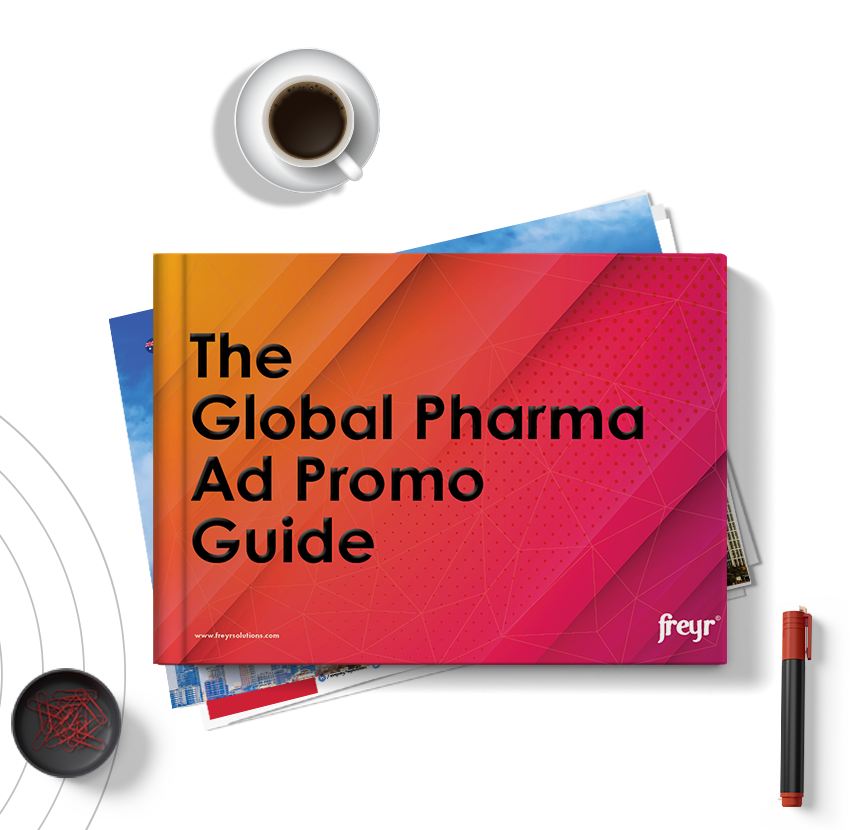What will you learn
from this book?
We are happy to announce the launch of our Global Pharma Ad Promo Guide, your go-to resource for Regulatory requirements and guidelines for countries across the globe. Our comprehensive guide offers a wealth of information on various rules and regulations, helping you navigate the complex Regulatory landscape of global pharmaceutical marketing and ensure compliance and maximize the efficacy of your marketing campaigns.

With our guide, you can
- Stay up to date on key Regulatory changes in the pharmaceutical advertising and promotional material space worldwide.
- Understand the specific requirements for and restrictions on advertising and promotions in different regions, ensuring that your marketing campaigns are compliant with the local regulations of an area.
- Learn about cultural differences and considerations for effective marketing strategies across different regions.
- Access quick and easy-to-read summaries of Regulatory requirements for each country, which will in turn help you identify key rules and restrictions with ease.
- Stay updated on evolving requirements and develop compliant and impactful marketing strategies across global markets. Moreover, by leveraging our guide, pharmaceutical marketers, advertisers, and Regulatory professionals can confidently navigate diverse Regulatory landscapes across countries.
- Facilitate the marketing approach for any product in a particular region to avoid warning letters/ penalties
Explore our Global Pharma Ad Promo Guide with information on
80+
countries to empower your global marketing efforts, while maintaining compliance and upholding the highest standards of patient safety and ethical practices.
To know more about the Guide
Ad Promo FAQs
Ensuring compliance with the Regulatory guidelines is crucial for pharmaceutical companies to provide accurate and reliable information about their products, protect consumers, and minimize risks. Promotional material compliance helps prevent misleading claims, ensures access to facts about side effects and efficacy, and enables consumers to make informed decisions. Failure to comply with the regulations can lead to legal and reputational consequences for companies.
Pharmaceutical companies can find guidance on advertising pharmaceutical products in the United Kingdom (UK) from the ‘Blue Guide,’ which is regulated by the Medicines and Healthcare Products Regulatory Agency (MHRA). The MHRA regulates laws around advertisements and promotions of drug products in the UK. The Guide assists companies in understanding and complying with the Regulatory requirements for advertising pharmaceuticals in the UK.
No, the promotional material review process is relevant to pharmaceutical companies targeting global markets. Compliance with the Regulatory guidelines is essential regardless of the market, as it ensures the success of drug promotion campaigns and the overall integrity of pharmaceutical products. Regulatory requirements may vary across different regions. So, it is crucial for companies to adapt their promotional materials to meet the specific guidelines of each target market.
Monitoring Key Performance Indicators (KPIs) provides valuable insights into the effectiveness of an MLR review process. These KPIs include adherence to strict guidelines specific to that country while reviewing, conducting peer review and quality checks on each step of the review process, usage of developed terminologies for communicating review findings and additional training on prescriptive annotations, defining quality expectations by considering QC, and achieving optimal timelines.
No. The US FDA regulates advertising only for prescription drugs. It does not oversee the advertising of Over-the-Counter (OTC) drugs. The Federal Trade Commission (FTC) is responsible for regulating OTC drug ads. The FDA also oversees the advertising for certain kinds of medical devices, such as hearing aids, lasers used in LASIK procedures, and contact lenses.
Ads are not required to provide information on the cost of the drug, the availability of a cheaper generic version, alternative drugs with different risks, lifestyle changes that may help with the condition, the prevalence of the condition being treated, the mechanism of action of the drug, or the specific percentage of individuals who will benefit from taking the drug. However, if an ad claims the drug's quick effectiveness, it must define the term "quickly" in the context of the drug's action. The extent of required information depends on the prescribing information specific to the drug.
A pharmaceutical advertisement can be considered as violating HA claims, if it has:
- Misleading Claims: If an advertisement makes false or misleading claims about the effectiveness, safety, or benefits of a pharmaceutical product, it can violate the HA laws. Providing inaccurate information or exaggerating the product's capabilities can mislead consumers and compromise their health decisions.
- Unsubstantiated Claims: HA laws often require pharmaceutical advertisements to have scientific evidence to support their claims. It can be considered a violation if an ad fails to provide adequate evidence or makes unsupported claims about the product's efficacy.
- Off-label Promotion: Has to regulate the promotion of pharmaceutical products for their approved uses. Advertising a drug for uses not approved by the Regulatory authorities, known as off-label promotion, is generally prohibited and can lead to legal violations.
- Failure to Disclose Risks: Pharmaceutical advertisements must provide balanced information about a product, including its potential risks and side effects. Failing to disclose or downplay known risks can violate HA laws, as it undermines the consumers' ability to make informed decisions.
- Non-compliance with Advertising Guidelines: HAs often issue specific guidelines regarding the content, format, and presentation of pharmaceutical advertisements. If an ad fails to adhere to these guidelines, such as omitting required warnings or using inappropriate imagery, it can be considered a violation of the law.
- Promotion to Unauthorized Audiences: HA laws may restrict the target audience for pharmaceutical advertisements. For example, promoting prescription drugs directly to the general public in countries where it is prohibited can be a violation.
- Comparative Advertising: Comparative advertising, where a pharmaceutical product is compared to other products, must comply with specific regulations. Making false or misleading comparisons that denigrate competing products can lead to a violation of HA laws.
- Pharmaceutical companies need to familiarize themselves with the applicable laws and regulations set forth by HAs to ensure compliance and avoid any violations in their advertising practices.
The guide is freely accessible at https://www.freyrsolutions.com/form/get-your-e-book?pdf=post-launch-ad-promo-guide. Please fill in the form and gain access.
The eBook helps RA professionals to understand the advertisement and promotional laws for pharmaceuticals in over eighty (80) countries.
Freyr has a team of experts who are updated with Health Authority guidelines to stay compliant with country-specific regulations.
